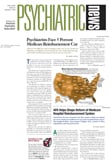Two scientists who discovered a cellular phenomenon that led to the development of the magnetic resonance imaging (MRI) technique have been awarded the 2003 Nobel Prize in Physiology or Medicine.
In the years following the pair’s discoveries, MRI would become vital to understanding principles at the core of neuropsychiatry.
The Nobel Assembly at the Karolinska Institute in Stockholm, Sweden, recognized Paul Lauterbur, Ph.D., professor and director of the biomedical magnetic resonance laboratory at the University of Illinois College of Medicine at Urbana-Champaign, along with Sir Peter Mansfield, Ph.D., professor emeritus of physics at England’s University of Nottingham, for “seminal discoveries concerning the use of magnetic resonance to visualize different structures. These discoveries have led to the development of modern magnetic resonance imaging, MRI, which represents a breakthrough in medical diagnostics and research.”
Worldwide, more than 22,000 MRI cameras acquired over 60 million images during 2002, according to the Nobel Assembly’s press release, “and the method is still in rapid development.”
In addition, the Nobel Assembly recognized the monumental contribution MRI has made to neuroscience, noting that while MRI is used to examine almost all organs of the body, “the technique is especially valuable for detailed imaging of the brain and spinal cord,” the press release continued. “Nearly all brain disorders lead to alterations in water content, which is reflected in the MRI picture. A difference in water content of less than a percent is enough to detect a pathological change.”
A number of psychiatric researchers have in the last decade used MRI and its offspring, functional-MRI, which is capable of tracking metabolic changes in neural tissues over time, to shed light on both structural and physiological components of mental illness.
One researcher prominent in neuropsychiatric imaging applauded the Nobel Assembly’s choice. “MRI has played a critical role in fostering a remarkable explosion of knowledge about brain structure and function,” Gary Small, M.D., told Psychiatric News. Small is the Parlow-Solomon professor on aging and professor of psychiatry and biobehavioral sciences at the University of California at Los Angeles Neuropsychiatric Institute.
“Patients with neuropsychiatric conditions have already benefited from this discovery,” Small told Psychiatric News, “and the technology will likely continue to contribute to further discoveries that stave off degeneration of the brain.”
More information about this year’s Nobel Prize is posted on the Web at www.nobel.se/medicine/laureates/2003/index.html. ▪
